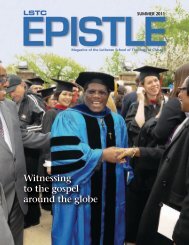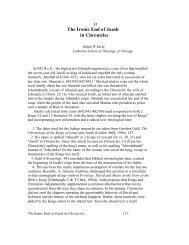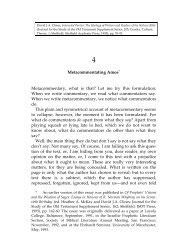1 Psalms in Chronicles Ralph W. Klein May 13, 2004 While we have ...
1 Psalms in Chronicles Ralph W. Klein May 13, 2004 While we have ...
1 Psalms in Chronicles Ralph W. Klein May 13, 2004 While we have ...
Create successful ePaper yourself
Turn your PDF publications into a flip-book with our unique Google optimized e-Paper software.
<strong>Psalms</strong> <strong>in</strong> <strong>Chronicles</strong><strong>Ralph</strong> W. Kle<strong>in</strong><strong>May</strong> <strong>13</strong>, <strong>2004</strong><strong>While</strong> <strong>we</strong> <strong>have</strong> learned much <strong>in</strong> the last century about the forms and the social sett<strong>in</strong>g ofthe <strong>Psalms</strong>, it rema<strong>in</strong>s a fact that <strong>we</strong> know very little about how the Psalter was used <strong>in</strong>public worship before the rise of the synagogue. The proposals made <strong>in</strong> the middle of thelast century about a covenant renewal festival <strong>in</strong> ancient Israel (by Artur Weiser <strong>in</strong> ATD),an enthronement festival of Yah<strong>we</strong>h (Sigmund Mow<strong>in</strong>ckel, <strong>in</strong> numerous publications), ora festival celebrat<strong>in</strong>g the k<strong>in</strong>gly rule of Yah<strong>we</strong>h (Hans Joachim Kraus <strong>in</strong> BiblischerKommentar) <strong>have</strong> largely passed <strong>in</strong>to the history of prior scholarship leav<strong>in</strong>g few sureresults <strong>in</strong> their wake. That some psalms <strong>we</strong>re used to accompany a sacrifice (Ps 50:24) orthat others <strong>we</strong>re used as entrance liturgies (<strong>Psalms</strong> 15 and 24) or <strong>in</strong> the course ofpilgrimages or processions (<strong>Psalms</strong> 120-<strong>13</strong>4) is true, but these contributions to ourunderstand<strong>in</strong>g of how psalms <strong>we</strong>re used <strong>in</strong> public worship rema<strong>in</strong> fairly rudimentary.Suggestions with<strong>in</strong> <strong>Psalms</strong>, such as “B<strong>in</strong>d the festal procession with branches, up to thehorns of the altar” (Ps 118:27) or exhortations to perform music, such as “Blow thetrumpet at the new moon, at the full moon, on our festal day” (Ps 81:4) reta<strong>in</strong>, now asbefore, some promise.But there is one book with<strong>in</strong> Scripture where <strong>Psalms</strong> are used <strong>in</strong> a liturgicalcontext, namely <strong>Chronicles</strong>, and 1 <strong>Chronicles</strong> 16 and 2 <strong>Chronicles</strong> 6 <strong>in</strong> particular, whereselections from <strong>we</strong>ll-known <strong>Psalms</strong> accompany the transfer of the ark to Jerusalem andthe dedication of the temple. These too are limited pieces of evidence s<strong>in</strong>ce <strong>we</strong> do notknow with any certa<strong>in</strong>ty whether David’s transfer of the ark was subsequently observed1
liturgically or <strong>in</strong> a procession that recited these <strong>Psalms</strong> (but see Psalm <strong>13</strong>2), but <strong>we</strong> do<strong>have</strong> examples here of how <strong>Psalms</strong> <strong>we</strong>re <strong>in</strong>terpreted or reapplied <strong>in</strong> late Persian times.One supposes that the Chronicler’s assignment of psalms to these liturgies did not strikehis readers as absurd. Incidentally this reuse and rewrit<strong>in</strong>g of these <strong>Psalms</strong> also suggestthat the Psalter probably had not reached its f<strong>in</strong>al canonical form when <strong>Chronicles</strong> waswritten, as is also <strong>in</strong>dicated by the variant order of Books 4 and 5 of the Psalter <strong>in</strong> the<strong>Psalms</strong> scroll from Cave 11 at Qumran.1 <strong>Chronicles</strong> 16:8-36 (see the handout) consists of excerpts from three canonicalpsalms: Psalm 105:1-15; Psalm 96:1-<strong>13</strong>; and Psalm 106:1, 47-48 (all from Book IV ofthe Psalter).Psalm 105 is a psalm of thanksgiv<strong>in</strong>g. After a call to give thanks for Yah<strong>we</strong>h’swonderful works (vv. 1-6), the Psalm recounts Yah<strong>we</strong>h’s efforts on Israel’s behalf <strong>in</strong> thepast, <strong>in</strong>clud<strong>in</strong>g his covenant with and care for the matriarchs and patriarchs (vv. 7-15), hisprovision of Joseph to save Israel from fam<strong>in</strong>e (vv. 16-22), his liberation of Israel fromthe hardships of Egypt (vv. 23-38), his supply<strong>in</strong>g Israel with food and dr<strong>in</strong>k dur<strong>in</strong>g thewilderness wander<strong>in</strong>g (vv. 39-42), and f<strong>in</strong>ally his gracious gift of the Land (vv. 43-45).Only the first fifteen verses of this Psalm are <strong>in</strong>cluded <strong>in</strong> 1 <strong>Chronicles</strong> 16. Were the nextthirty verses—with the mention of plagues and the dread that afflicted Egypt--consideredtoo potentially revolutionary for the context <strong>in</strong> which the Chronicler wrote?Psalm 106, another hymn of praise (mixed with a theology similar to that of theDeuteronomistic History), provides a history of s<strong>in</strong> and judgment <strong>in</strong> Israel. The psalmistpraises Yah<strong>we</strong>h for rema<strong>in</strong><strong>in</strong>g faithful to God’s people despite their long history of s<strong>in</strong>and apostasy. Periods of s<strong>in</strong> (vv. 6-7 [<strong>in</strong> Egypt and at the Red Sea], <strong>13</strong>-14 [<strong>in</strong> their2
ebellions <strong>in</strong> the wilderness], 16 [<strong>in</strong> rebell<strong>in</strong>g aga<strong>in</strong>st Moses and Aaron], 19-22 [<strong>in</strong> the<strong>in</strong>cident with the golden calf], 24-25 [<strong>in</strong> the <strong>in</strong>cident with the doubt<strong>in</strong>g spies], 28 [<strong>in</strong> theirapostasy at Baal Peor], 32-39 [<strong>in</strong> apostasy dur<strong>in</strong>g the period of the judges and later], 43band their frequent subsequent rebellions) <strong>we</strong>re follo<strong>we</strong>d by periods of judgment (vv. 15,17-18, 26-27, 29, 40-42, 43c), and then aga<strong>in</strong> and aga<strong>in</strong> by periods of Yah<strong>we</strong>h’scompassionate protection and deliverance (vv. 8-12, 23, 30-31, 43a, 44-46). The last twoverses of the psalm are a prayer for deliverance from the exile (v. 47) and the conclusionto Book IV of the Psalter (v. 48). Of these forty-eight verses, only the first verse and thelast two make it <strong>in</strong>to the new psalm <strong>in</strong> 1 <strong>Chronicles</strong> 16. Ironically, none of the verses thatgive this psalm its identity—s<strong>in</strong>, judgment, div<strong>in</strong>e compassion, protection, anddeliverance—make it <strong>in</strong>to 1 <strong>Chronicles</strong> 16.Psalm 96 is a third hymn of praise. After a call to praise <strong>in</strong> vv. 1-3, the reasonsfor praise are given <strong>in</strong> vv. 4-6, namely Yah<strong>we</strong>h’s superiority over all other gods. Asecond call to praise takes place <strong>in</strong> vv. 7-9, follo<strong>we</strong>d by a proclamation that Yah<strong>we</strong>h isk<strong>in</strong>g and judge of all the earth, both now and <strong>in</strong> the future (vv. 10-<strong>13</strong>). This Psalm is<strong>in</strong>cluded bet<strong>we</strong>en <strong>Psalms</strong> 105 and 106 <strong>in</strong> 1 <strong>Chronicles</strong> 16. The only omitted l<strong>in</strong>es are vs.96:10b “he will judge the nations with equity” and 96:<strong>13</strong>b “he will just the world withrighteousness, and the peoples with his truth.” The Chronicler may <strong>have</strong> found it moreappropriate for the people to hope for some manifestation of Yah<strong>we</strong>h’s sovereignty <strong>in</strong>nature than for them to declare Yah<strong>we</strong>h’s sovereignty <strong>in</strong> history conv<strong>in</strong>c<strong>in</strong>gly before theirpolitical and military masters.<strong>While</strong> scholars <strong>have</strong> long studied the text critical differences bet<strong>we</strong>en the texts ofthese psalms <strong>in</strong> the Psalter and the copies of them <strong>in</strong> <strong>Chronicles</strong>, it has only recently been3
asked what sort of poem has resulted by putt<strong>in</strong>g these psalms together <strong>in</strong> a new medley oreven <strong>in</strong>to a new poem. Older commentators, such as Myers <strong>in</strong> the Anchor Bible (1:121),referred readers to the Psalm commentaries for further exegesis after a few <strong>in</strong>troductoryremarks. Even Rudolph remarks <strong>in</strong> his still-standard <strong>Chronicles</strong> commentary (p. 128):“Die E<strong>in</strong>zelexegese ist Sache der Psalmenkommentare.” But, of course, that is not so.The Chronicler has composed a new poem and placed it <strong>in</strong> a liturgy celebrat<strong>in</strong>g thearrival of the ark of the covenant <strong>in</strong> Jerusalem. We need to ask what this Psalm and its<strong>in</strong>dividual verses meant <strong>in</strong> that new context.Accord<strong>in</strong>g to the Chronicler, David had already <strong>in</strong> his time <strong>in</strong>augurated thes<strong>in</strong>g<strong>in</strong>g of praises by the Levitical s<strong>in</strong>gers <strong>in</strong> public worship, a practice which wasprobably characteristic of the temple worship known by the Chronicler <strong>in</strong> the mid fourthcentury. That is, he attempted to establish a cont<strong>in</strong>uity bet<strong>we</strong>en the worship life of Davidand that of his won day. David’s authority now stood beh<strong>in</strong>d the role of the Levites andthe use of psalmody <strong>in</strong> worship. The Chronicler’s credibility <strong>in</strong> claim<strong>in</strong>g Davidicauthority for this practice was no doubt enhanced by his reuse of <strong>we</strong>ll-known <strong>Psalms</strong>.What is the structure and message of this new coherent psalm that the Chroniclerput together out of fragments of three other psalms? This psalm consists of three partsthat <strong>we</strong> call I. Israel’s praise, II. <strong>in</strong>ternational praise, and III. cosmic praise. Israel isportrayed as liv<strong>in</strong>g among the nations and its God is proclaimed as sovereign over othergods and the nations. The form of the Psalm is a thanksgiv<strong>in</strong>g, draw<strong>in</strong>g on the firstverses of Psalm 105 and the last verses of Psalm 106. Toward the end there is also a briefpetition. Ho<strong>we</strong>ver the rest of the psalms <strong>in</strong> the Psalter may <strong>have</strong> been composed, thispsalm was put together at a desk, through careful selection and coord<strong>in</strong>ation of verses4
from known psalms. The context of this psalm is the worship of the temple, and itconveys a feel<strong>in</strong>g of national vulnerability.The open<strong>in</strong>g imperative <strong>in</strong> v. 8, from Psalm 105, “Thank Yah<strong>we</strong>h,” is balancedby a similar imperative near the end <strong>in</strong> v. 34, orig<strong>in</strong>ally from Psalm 106: “Give thanksto Yah<strong>we</strong>h for he is good, for his loyalty lasts forever.” The thanksgiv<strong>in</strong>g at thebeg<strong>in</strong>n<strong>in</strong>g of the psalm is for Yah<strong>we</strong>h’s past actions, the exhortation to give thanks at theend of the psalm <strong>in</strong>troduces the petition for Yah<strong>we</strong>h’s <strong>in</strong>tervention now and <strong>in</strong> the future.The concern for “the peoples”—make known his deeds among the peoples--forms asignificant theme throughout this new composition.The psalm urges the Israelite audience to seek Yah<strong>we</strong>h and his strength, to seekhis face cont<strong>in</strong>ually (v. 11). This word “seek” is central to the Chronicler’s theology.David had earlier confessed <strong>in</strong> the ark narrative that Yah<strong>we</strong>h had not been soughtcorrectly <strong>in</strong> the days of Saul. In fact <strong>we</strong> will speak later of the four virtues of theChronicler’s theology: to humble oneself, to pray, to seek Yah<strong>we</strong>h’s face, and to turnfrom evil do<strong>in</strong>gs (2 Chr 7:14).The reference to Yah<strong>we</strong>h’s strength is apparently anallusion to the ark, whose journey from Kiriath-jearim to Jerusalem has taken up the lastfour chapters (1 <strong>Chronicles</strong> <strong>13</strong>-16). 2 <strong>Chronicles</strong> 6:41, which <strong>we</strong> will look at later, alsorefers to Yah<strong>we</strong>h and his strong ark.The judgments of Yah<strong>we</strong>h’s mouth (v. 12) are universally effective accord<strong>in</strong>gto v. 14: they are “<strong>in</strong> all the earth,” and this is complementary to the particularconfession <strong>in</strong> that same verse: “He is Yah<strong>we</strong>h our God.” The Chronicler focuses hisexhortation on the faithful community, here called the seed of Israel and the children ofJacob (v. <strong>13</strong>). “Israel”/Jacob is the most important of the ancestors <strong>in</strong> <strong>Chronicles</strong>. Psalm5
105 had referred to the seed of Abraham and the children of Jacob, the descendants oftwo different ancestral <strong>in</strong>dividuals.Psalm 105:12 had said that Yah<strong>we</strong>h had remembered his covenant with thematriarchs and patriarchs. Now the Chronicler turns that <strong>in</strong>dicative <strong>in</strong>to an imperative forhis audience: You, remember God’s eternal covenant (v. 15). Yah<strong>we</strong>h’s covenantwith Israel and his covenantal loyalty (v. 34) are both confessed to be everlast<strong>in</strong>g, whilehis word (or promise) is said to last for a thousand generations (v. 15). Though Genesisactually reports only God’s covenant with Abraham, that ancestral covenant is herevouchsafed to all three major ancestors: Abraham and Isaac (v. 16) and Jacob/Israel(v. 17). This everlast<strong>in</strong>g div<strong>in</strong>e covenant, as <strong>in</strong> the priestly document <strong>in</strong> the Pentateuch(Gen 17:8; Exod 6:8), guarantees to Israel the possession of the land (v. 18).In v. 18, the Chronicler moves out of the objective mode, <strong>in</strong> which he has beenreferr<strong>in</strong>g to Israel’s ancestors as people long s<strong>in</strong>ce gone by, and he addresses his audienceas “you,” aga<strong>in</strong> chang<strong>in</strong>g the text of Psalm 105:12. The Chronicler’s own audience hadsurely known what it meant to be few <strong>in</strong> number, <strong>in</strong>significant sojourners <strong>in</strong> a foreignland. Their experience echoes that of their ancient matriarchs and patriarchs. Yah<strong>we</strong>hhad allo<strong>we</strong>d no one to oppress those ancient ancestors (v. 21). The Chronicler’saudience would surely <strong>have</strong> heard a startl<strong>in</strong>g contrast <strong>in</strong> this verse bet<strong>we</strong>en the patriarchs’freedom from oppression and their own current experience under the Persians. But thepromises made to vulnerable Abraham and Sarah had freed them from harm; and that,ultimately, would be contemporary Israel’s fate as <strong>we</strong>ll.The value placed on by the ancestors is exemplified by their dist<strong>in</strong>ctive titles: Donot touch my ano<strong>in</strong>ted ones; do no harm to my prophets (v. 22). The Chronicler may6
also <strong>have</strong> applied this verse to his present situation, treat<strong>in</strong>g contemporary Israel as aroyal and prophetic people, and thus democratiz<strong>in</strong>g these terms so that they applied to thewhole people of God. The Chronicler expected his politically <strong>in</strong>significant audience toidentify with the ancient matriarchs and patriarchs, <strong>in</strong> their vulnerability and <strong>in</strong> theirfreedom from harm.International PraiseAt this po<strong>in</strong>t the Chronicler moves to the second po<strong>in</strong>t of his new psalm, theemphasis on <strong>in</strong>ternational praise, and it is probably only <strong>we</strong> who can look up the sourceof his quotation who recognize that he has also moved from Psalm 105 to Psalm 96.Those addressed <strong>in</strong> the new, Chronistic Psalm change: previously it was Israel, now it isthe nations. The Chronicler drops the first l<strong>in</strong>e of Psalm 96—S<strong>in</strong>g to Yah<strong>we</strong>h a newsong—either because he thought a new song would be <strong>in</strong>appropriate <strong>in</strong> an <strong>in</strong>vitationaddressed to a non-Israelite audience, or because he considered such an <strong>in</strong>vitation<strong>in</strong>appropriate <strong>in</strong> the middle of a Psalm. Here he <strong>in</strong>vites the nations (v. 24) and thepeoples (v. 28) to celebrate <strong>in</strong> advance Yah<strong>we</strong>h’s eschatological victories. Later creationas a whole will also be <strong>in</strong>vited to praise Yah<strong>we</strong>h (vv. 31-33).The Chronicler’s theology is monotheistic, or at least strongly monolatrous: Thegods of the people are idols, but Yah<strong>we</strong>h made the heavens (26). Strength and joyare <strong>in</strong> his place (v. 27). <strong>While</strong> joy and rejoic<strong>in</strong>g are frequent <strong>in</strong> <strong>Chronicles</strong>, also <strong>in</strong>chapter 16, this is the only time the Chronicler uses this particular Hebrew word for joy.The Chronicler uses “place” <strong>in</strong>stead of “sanctuary” (Ps 96:6) because <strong>in</strong> the Jerusalemof David’s time, accord<strong>in</strong>g to the Chronicler, there <strong>we</strong>re no sacrifices at Jerusalem, notemple, but only the ark, with its tent, and the service of song (1 Chr 16:4-6, 37-38).7
Psalm 96, of course, clearly presupposed the existence of the temple. This “place” is forthe Chronicler only the location where Solomon’s temple will one day stand.Verses 28-29 (Ascribe to Yah<strong>we</strong>h, O families of the peoples), as <strong>in</strong> Psalm 96:6-8,are addressed to the nations. A similar exhortation <strong>in</strong> Ps 29:1-2 is addressed to the “sonsof God,” the members of Yah<strong>we</strong>h’s heavenly council. Lift up an offer<strong>in</strong>g and come<strong>in</strong>to his presence. Verses 28-30 explicitly <strong>in</strong>vite the nations of the world to worshipYah<strong>we</strong>h. They are <strong>in</strong>vited <strong>in</strong>to Yah<strong>we</strong>h’s presence (v. 29), not <strong>in</strong>to his courts as <strong>in</strong> Ps96:8, to avoid the anachronism of <strong>in</strong>vit<strong>in</strong>g foreigners at the time of David to worship <strong>in</strong>the temple that was first erected by Solomon. The offer<strong>in</strong>g they br<strong>in</strong>g is a k<strong>in</strong>d of tributedue to the div<strong>in</strong>e k<strong>in</strong>g. As <strong>we</strong> noted earlier, the Chronicler omitted Ps 96:10b: “He willjudge the peoples with equity.” He may not <strong>have</strong> wanted to alarm the Persians aboutIsrael’s <strong>in</strong>ternational goals.Cosmic praiseLet the heavens rejoice…let the earth be glad…let the sea roar….(vv. 31-32).The Chronicler <strong>in</strong>vites the whole tripartite cosmos—heaven, earth, and sea--to jo<strong>in</strong> <strong>in</strong> thecelebration of Yah<strong>we</strong>h’s k<strong>in</strong>gship. He moved the last l<strong>in</strong>e <strong>in</strong> v. 31 let them say amongthe nations, Yah<strong>we</strong>h is God, and rewrote it s<strong>in</strong>ce <strong>in</strong> Ps 96:10a it is an exhortation toIsrael to bear witness to the nations. Now the nations themselves are to herald Yah<strong>we</strong>h’sk<strong>in</strong>gship. Let the field…and trees of the forest (vv. 32-33). Agricultural land andstands of trees <strong>in</strong> the forest, too, are urged <strong>in</strong> an apostrophe—a direct appeal to ananimate or <strong>in</strong>animate object—to jo<strong>in</strong> <strong>in</strong> the chorus that celebrates Yah<strong>we</strong>h’s com<strong>in</strong>g tojudge, or rule, the earth.F<strong>in</strong>al Call to Thanksgiv<strong>in</strong>g8
To articulate this f<strong>in</strong>al exhortation, made to Israel, the Chronicler has reached <strong>in</strong>toanother psalm, the first verse and last two verses of Psalm 106, but the transition aga<strong>in</strong> isso smooth that <strong>we</strong> would not notice it without look<strong>in</strong>g it up. All he had to omit was theopen<strong>in</strong>g “Hallelujah.” He ends his new psalm <strong>in</strong> 1 <strong>Chronicles</strong> 16. as he began, withgiv<strong>in</strong>g thanks to Yah<strong>we</strong>h who is good and whose loyalty lasts forever. Variations onthis slogan appear aga<strong>in</strong> <strong>in</strong> v. 41 <strong>in</strong> this chapter and no less than six times <strong>in</strong> 2 <strong>Chronicles</strong>.Petition for Israel’s DeliveranceBy add<strong>in</strong>g the words “And say” to the quotation from Psalm 106 (v. 35), theChronicler emphasizes that his audience is to make the follow<strong>in</strong>g prayer their own.Instead of referr<strong>in</strong>g to “Yah<strong>we</strong>h our God,” as <strong>in</strong> Ps 146:47, the Chronicler refers to thedeity as O God of our salvation. This may <strong>have</strong> seemed more appropriate <strong>in</strong> a petitionask<strong>in</strong>g God to save or deliver the people.Gather us and deliver us from the nations. In Psalm 106:47 the imperative“gather” reflected the scattered or exiled condition of the people addressed. Exile hadalready been threatened <strong>in</strong> the wilderness (Ps 106:47) and had become a reality later <strong>in</strong>the psalm (vv. 40-46). To this quotation the Chronicler added the words “deliver us.”Deliverance from Persian dom<strong>in</strong>ation may <strong>have</strong> been a more burn<strong>in</strong>g issue than Israel’sdispersal at the Chronicler’s time even if, for political reasons, that author avoided adirect criticism of, or an attack upon, the Persians. Gather<strong>in</strong>g Israel from the nations, ofcourse is appropriate for almost any time when the Chronicler may <strong>have</strong> been writ<strong>in</strong>g.Blessed be Yah<strong>we</strong>h the God of Israel (v. 36). The Chronicler’s Psalmconcludes with the same div<strong>in</strong>e title—Yah<strong>we</strong>h the God of Israel--which was the object ofthe <strong>in</strong>vocation, thanksgiv<strong>in</strong>g, and praise of the s<strong>in</strong>gers <strong>in</strong> the narrative <strong>in</strong>troduction to this9
chapter, v. 4., just before this new psalm began. This bless<strong>in</strong>g with this full div<strong>in</strong>e titlelater appears <strong>in</strong> the mouth of Hiram, k<strong>in</strong>g of Tyre (2 Chr 2:11 [12]) and of Solomonhimself (2 Chr 6:4).And all the people said, “Amen, and praise Yah<strong>we</strong>h.” (v. 36) These words arepart of the doxology at the end of Psalm 106 and not really part of the psalm itself. They<strong>in</strong>dicate to us of course that the fourth book of the Psalter was completed by the time ofthe Chronicler. All the people accord<strong>in</strong>g to the Chronicler had jo<strong>in</strong>ed David <strong>in</strong> br<strong>in</strong>g<strong>in</strong>gthe ark back to Jerusalem—ho<strong>we</strong>ver unlikely that is historically--and now they endorsethe song of the Levites. This f<strong>in</strong>al doxology serves as a bridge passage to take theChronicler back to his ark narrative.This psalm is a good example of the doxological character of worship <strong>in</strong><strong>Chronicles</strong>. <strong>While</strong> <strong>in</strong> the century before him, both Ezra and Nehemiah had expressed anarrow view of Israel, that required forced divorces from those who <strong>we</strong>re not recognizedas true Israelites, the Chronicler has a more expansive view of Israel, beg<strong>in</strong>n<strong>in</strong>g with hisprovid<strong>in</strong>g genealogies for all of the t<strong>we</strong>lve tribes of Israel at the beg<strong>in</strong>n<strong>in</strong>g of his work.He <strong>in</strong>vites all Israel to rally round the temple <strong>in</strong> Jerusalem, and he breaks through eventhe boundaries of Israel <strong>in</strong> this psalm as he exhorts the nations and even the entire cosmosto praise Yah<strong>we</strong>h.2 <strong>Chronicles</strong> 6:40-42We move now to the brief excerpts from Psalm <strong>13</strong>2 (see the next part of thehandout) that appear as the conclusion of Solomon’s long prayer at the dedication of thetemple <strong>in</strong> 2 Chr 6:14-39. In the course of his prayer, Solomon had prayed for Yah<strong>we</strong>h to10
egard to what <strong>we</strong> would call the first commandment, and threatens that such apostasywould lead to exile and to the destruction of the temple.The Chronicler took over this theophany from 1 K<strong>in</strong>gs 9 <strong>in</strong> 2 Chr 7:12-22,expanded it, made additional changes and, <strong>in</strong> my judgment, radically redirected its focus.The first paragraph (p. 3 of the handout) beg<strong>in</strong>s with the <strong>in</strong>troductory paragraph fromK<strong>in</strong>gs, but then <strong>in</strong>serts with<strong>in</strong> it a major paragraph that outl<strong>in</strong>es what pious Israelitesshould do <strong>in</strong> case of national calamity— I <strong>have</strong> entitled this additional paragraph thePositive response of the people. <strong>While</strong> this paragraph is cast as a div<strong>in</strong>e oracle it surelyis a clear presentation of the author’s own view. This <strong>in</strong>serted paragraph beg<strong>in</strong>s and endswith Yah<strong>we</strong>h’s choice of the temple: “I <strong>have</strong> chosen this place” and “For now I <strong>have</strong>chosen.” In the temple prayer itself, <strong>in</strong> ch. 6, Solomon had mentioned a variety ofpossible disasters that might occur, <strong>in</strong>clud<strong>in</strong>g, defeat <strong>in</strong> war and exile, but <strong>in</strong> this newadditional paragraph the Chronicler only mentions the k<strong>in</strong>ds of dangers that faced thecommunity of his day—drought, locusts, and pestilence. In case of such calamities,Solomon urges the people to humble themselves, pray, seek Yah<strong>we</strong>h’s face, and turnfrom their evil do<strong>in</strong>gs. That is, they are not to just pray <strong>in</strong> or toward the temple asSolomon had asked, but they are to participate fully <strong>in</strong> a transformed religious life.These four virtues crop up time and aga<strong>in</strong> <strong>in</strong> the balance of the Chronicler’s story. 1Butat the conclusion to his book, when Jerusalem falls, the Chronicler s<strong>in</strong>gles out the lastk<strong>in</strong>g Zedekiah for specific criticism: he did not humble himself (2 Chr 36:12) and he didnot turn to Yah<strong>we</strong>h (2 Chr 36:<strong>13</strong>). The dawn<strong>in</strong>g of a new age <strong>in</strong> the last verses of1 Humble themselves: Rehoboam, the northern tribes of Asher, Manasseh and Zebulun, Hezekiah,Manasseh, and Josiah.Pray: Hezekiah and ManassehSeek Yah<strong>we</strong>h’s face: the faithful at the time of Rehoboam, Asa, and JehoshaphatTurn: Asa, Hezekiah.16
<strong>Chronicles</strong> had noth<strong>in</strong>g to do with the behavior of its k<strong>in</strong>gs or the hope for a restorationof the monarchy, but only with the benefactions of Cyrus, the Persian k<strong>in</strong>g, whose spiritYah<strong>we</strong>h had stirred up, to send the Jews home to build the temple. In this paragraph<strong>in</strong>serted <strong>in</strong> ch. 7, <strong>in</strong> any case, the emphasis is also exclusively on the people and thetemple, there is not a word about the responsibility of the k<strong>in</strong>g. The people are the onesover whom Yah<strong>we</strong>h’s name is called, just as that name is called over the temple <strong>in</strong> 2 Chr6:33.By the time of the Chronicler the post-exilic community had existed for a centuryand a half with a fully function<strong>in</strong>g temple but without a k<strong>in</strong>g. If the Chronicler had feltany need for the re<strong>in</strong>stitution of the monarchy, he would <strong>have</strong> had to make a strong casefor it. Instead, his additional paragraph puts the onus of responsibility exclusively on thepeople. Yah<strong>we</strong>h promises to forgive—for which Solomon had repeatedly prayed <strong>in</strong> 2Chr 6:21, 25, 27, 30, and 39—and to heal provided that Israel humbles itself, prays, seeksYah<strong>we</strong>h’s face, and repents. At the time of judgment <strong>in</strong> 2 Chr 36:16 there was no heal<strong>in</strong>gbecause of the s<strong>in</strong>s of the k<strong>in</strong>g and the people. But the promise <strong>in</strong> this programmaticverse is that there will always be forgiveness and heal<strong>in</strong>g for those who wholeheartedlyparticipate <strong>in</strong> Israel’s religious life and <strong>in</strong> the temple’s worship.When the Chronicler rejo<strong>in</strong>s the Vorlage of K<strong>in</strong>gs <strong>in</strong> v. 16, after his <strong>in</strong>sertedparagraph, the emphasis is on the permanence of Yah<strong>we</strong>h’s commitment to the temple—his name will be there forever, his eyes and heart always. He even does not <strong>in</strong>clude areference to Solomon’s build<strong>in</strong>g of the house from the Vorlage <strong>in</strong> K<strong>in</strong>gs: “which you<strong>have</strong> built to put my name there” (see the left hand box).17
The Chronicler does <strong>in</strong>clude an equivalent for vv. 4-5, the conditional dynasticpromise to the house of David. But this conditional promise is relativized by be<strong>in</strong>gpreceded and follo<strong>we</strong>d by longer paragraphs deal<strong>in</strong>g with the positive and negativeconsequences of community behavior. There are also four changes <strong>in</strong> this paragraph thatneed discussion. The first is the omission of “with a perfect heart and withuprightness.” This does not change the mean<strong>in</strong>g of the text appreciably and theChronicler elsewhere also deemphasizes the comparison with David (cf. 2 Chr 1:8//1 Kgs3:6). The second change is the replacement of the word “promised” with “made acovenant,” which seem to be roughly synonymous. Some scholars <strong>have</strong> proposed thatthis results from a copyist’s error: dbrty was miswritten as krty. The third change occurs<strong>in</strong> the last words of the paragraph where the Chronicler expresses the dynastic hope <strong>in</strong>words known elsewhere only <strong>in</strong> Mic 5:1. But this word<strong>in</strong>g is found already <strong>in</strong> 1 Kgs 9:5LXX so whatever difference <strong>in</strong> emphasis is <strong>in</strong>volved, if any, cannot be attributed to theChronicler himself but only <strong>in</strong> his variant copy of the book of K<strong>in</strong>gs. The one omissionrema<strong>in</strong><strong>in</strong>g that can be attributed to the Chronicler, the reference to Davidic k<strong>in</strong>gship overIsrael forever, fits with our thesis that the Chronicler placed little or no emphasis on there<strong>in</strong>stitution of the monarchy. <strong>While</strong> he reta<strong>in</strong>ed both references <strong>in</strong> the previousparagraph to Yah<strong>we</strong>h’s permanent residence <strong>in</strong> the temple, he deleted the permanencereference when it came to the house of David.In the f<strong>in</strong>al paragraph of 2 <strong>Chronicles</strong> 7 (vv. 19-22), he follows the text of hisVorlage fairly consistently. He deletes the words “and your descendants” s<strong>in</strong>ce theChronicler believed that retribution took place <strong>in</strong> each person’s lifetime and there was18
no heap<strong>in</strong>g up of guilt, as <strong>in</strong> the Deuteronomistic History. The other more or less m<strong>in</strong>orchanges <strong>in</strong> this paragraph need not bother us at this time.What is clear is that the Chronicler <strong>in</strong> 2 <strong>Chronicles</strong> 7 has put his emphasis on thepositive and negative consequences of the behavior of the people as a whole, or, <strong>in</strong> thecase of negative behavior, on the actions of the k<strong>in</strong>gs and the people as a whole. His callfor renewal comes <strong>in</strong> his <strong>in</strong>serted paragraph, <strong>in</strong> which the k<strong>in</strong>g plays no role, just as thek<strong>in</strong>g had played no role <strong>in</strong> the period of reconstruction up to the Chronicler’s time. Whenk<strong>in</strong>gs like Hezekiah are praised <strong>in</strong> the Chronicler’s history, it is as religious leaders whohumble themselves, pray, seek the face of Yah<strong>we</strong>h, and repent. The Chronicler seemsto <strong>have</strong> had no great desire of or hope for a future k<strong>in</strong>g from the l<strong>in</strong>e of David. His newpsalm, 2 Chr 6:41-42, created from fragments of Psalm <strong>13</strong>2, lacks completely the latter’smessianic, hymnic emphases. Instead it prays for Yah<strong>we</strong>h to go to his place of rest <strong>in</strong> thetemple, for the priests and loyal folk to receive material bless<strong>in</strong>gs, and for k<strong>in</strong>g Solomonmerely to <strong>have</strong> his long prayer ans<strong>we</strong>red, a prayer that basically asked God to ans<strong>we</strong>r thepeople’s prayers as <strong>we</strong>ll. And of course the last petition that Solomon made, <strong>in</strong> theconclusion to the prayer drafted by the Chronicler is simply this:And now, rise, YHWH God, to your rest,You and your strong ark.<strong>May</strong> your priests, YHWH God, be clothed with victory,<strong>May</strong> your loyal folk rejoice <strong>in</strong> prosperity.YHWH God, do not refuse your ano<strong>in</strong>ted one.19







